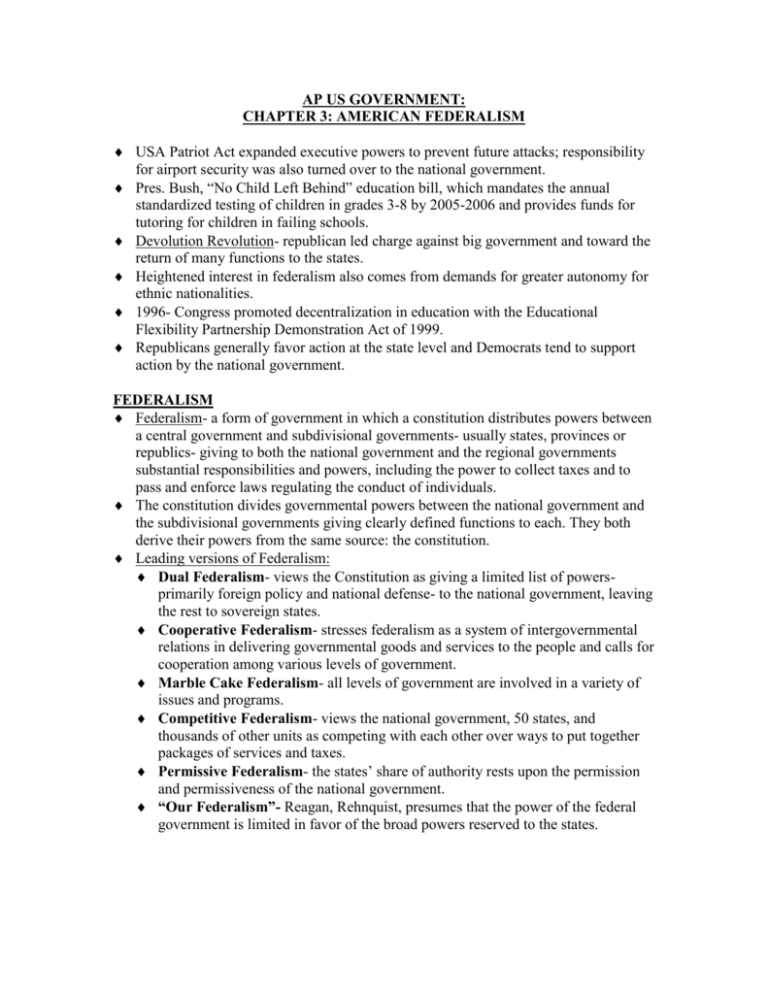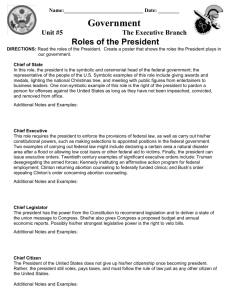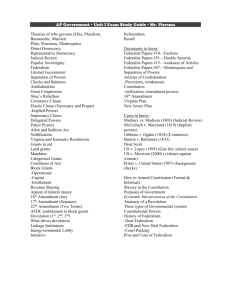ap us government - Deerfield Community School District
advertisement

AP US GOVERNMENT: CHAPTER 3: AMERICAN FEDERALISM USA Patriot Act expanded executive powers to prevent future attacks; responsibility for airport security was also turned over to the national government. Pres. Bush, “No Child Left Behind” education bill, which mandates the annual standardized testing of children in grades 3-8 by 2005-2006 and provides funds for tutoring for children in failing schools. Devolution Revolution- republican led charge against big government and toward the return of many functions to the states. Heightened interest in federalism also comes from demands for greater autonomy for ethnic nationalities. 1996- Congress promoted decentralization in education with the Educational Flexibility Partnership Demonstration Act of 1999. Republicans generally favor action at the state level and Democrats tend to support action by the national government. FEDERALISM Federalism- a form of government in which a constitution distributes powers between a central government and subdivisional governments- usually states, provinces or republics- giving to both the national government and the regional governments substantial responsibilities and powers, including the power to collect taxes and to pass and enforce laws regulating the conduct of individuals. The constitution divides governmental powers between the national government and the subdivisional governments giving clearly defined functions to each. They both derive their powers from the same source: the constitution. Leading versions of Federalism: Dual Federalism- views the Constitution as giving a limited list of powersprimarily foreign policy and national defense- to the national government, leaving the rest to sovereign states. Cooperative Federalism- stresses federalism as a system of intergovernmental relations in delivering governmental goods and services to the people and calls for cooperation among various levels of government. Marble Cake Federalism- all levels of government are involved in a variety of issues and programs. Competitive Federalism- views the national government, 50 states, and thousands of other units as competing with each other over ways to put together packages of services and taxes. Permissive Federalism- the states’ share of authority rests upon the permission and permissiveness of the national government. “Our Federalism”- Reagan, Rehnquist, presumes that the power of the federal government is limited in favor of the broad powers reserved to the states. Alternatives to Federalism Unitary Systems- a constitution vests all governmental power in the central government. In the US state constitutions usually create this kind of relationship between the state and its local governments. Confederations- sovereign nations through a constitutional compact create a central government but carefully limit the power of the central government and do not give it the power to regulate the conduct of individuals directly. WHY FEDERALISM? Federalism Checks the Growth of Tyranny- Americans tend to associate freedom with federalism. Diffusion of power- a political group may lose office, but still has power in other seats/states. Such diffusion of power creates problems because it makes it difficult for a national majority to carry own a program of action. Federalism Allows Unity Without Uniformity- national parties and politicians and parties do not have to iron out every difference on every issue that divides us, instead the issues are debated. Federalism Encourages Experimentation- state governments provide great “laboratories” for public policy experimentation, with states serving as proving grounds. If they adopt programs that fail, the negative effects are limited; if programs succeed, they can be adopted by other states. Federalism Keeps Government Closer to the People- federalism involves many people and helps keep government closer to the people. THE CONSTITUTIONAL STRUCTURE OF AMERICANFEDERALISM The formal constitutional framework of our federal system may be stated relatively simply: The national government has only those powers delegated to it by the Constitution (with the important exception of the inherent power over foreign affairs.) Within the scope of its operations, the national government is supreme. The state governments have the powers not delegated to the central government, except those denied to them by the Constitution and their state constitutions. Some powers are specifically denied to both the national and state governments; others are specifically denied only to the states; still others are denied to the national government but not the states. Powers of the National Government Express powers- powers specifically granted to one of the three branches of the national government by the Constitution, such as the power to regulate interstate commerce and appropriate funds. Implied Powers- powers inferred from the express powers that allow Congress to carry out its functions, such as the power to create banks. Necessary & Proper Clause- Article I, Sec. 8, Clause 18, gives Congress the right “to make all laws which shall be necessary and proper for carrying into execution the foregoing powers, and all other powers vested…in the government of the United States.” Inherent Powers- powers of the national government in the field of foreign affairs that the Supreme Court has declared do not depend on constitutional grants but rather grow out of the very existence of the national government. I.e.; the national government has the same authority to deal with other nations as if it were the central government unitary system. Together, these types of powers create a flexible system and allows the people to expand the central government’s powers to meet the needs of a modern nation in a global economy. Expansion of central government powers rests on four constitutional pillars: National Supremacy Article- Article VI, declares the Constitution the supreme law of the land- states may not override it. The War Power- the national government is responsible for protecting the nation, which includes the power to wage war. It has the power to do whatever is necessary and proper to wage war successfully. The power to regulate interstate and foreign commerce- congressional authority extends to all commerce that affects more than one state. Includes the production, buying, selling, renting and transporting of goods, services and properties. The Commerce Clause- Article I, Se. 8, Clause 3, gives Congress the power “to regulate Commerce with foreign nations, and among the several states, and with the Indian tribes.” Allows the Congress to find constitutional justification for regulating a wide range of human activity. Gibbons v. Ogden- 1824- asserted national interests over those of the states and laid the basis for the subsequent growth in congressional power over commerce. Congress’s power over interstate commerce is complete and overrides conflicting state laws. The Power to Tax and Spend Congress lacks constitutional authority to pass laws solely on the grounds that they will promote the general welfare, but it may raise taxes and spend money for this purpose. When Congress puts up the money, it determines how the money will be spent, but they can influence or control state operations and regulate individual conduct by withholding federal money. Federal Mandates- when Congress requires states to do certain things, for example, clean the air and water, or provide educational services. Often Congress does not provide funds required to carry out these “unfunded mandates” and it leaves states with growing expenditures and limited resources. Powers of the States Constitution reserves for the states all powers not granted to the national government. Concurrent Powers- powers the Constitution gives to both the national and state governments, such as levy taxes. Constitutional Limits & Obligations To make federalism work, the Constitution imposes certain restraints on both the national and the state governments. States are prohibited from: 1. Making treaties with foreign countries. 2. Authorizing private persons to prey on the shipping and commerce of other nations. 3. Coining money, issuing bills of credit, or making anything but gold and silver coin legal and tender in payment of debts. 4. Taxing imports or exports. 5. Taxing foreign ships. 6. Keeping troops or ships in time of peace (except for National Guard) 7. Engaging in war, unless invaded or in such imminent danger as will not admit of delay. Congress may not command states to enact laws to comply with or order state employees to enforce unfunded mandates. 11th Amendment guarantees a states’ sovereign immunity from lawsuits and forbids state employees from suing states in federal and state courts in order to force state compliance with federal employment laws. National government is obliged by the Constitution to protect states against domestic insurrections. Interstate Relations Full Faith & Credit Clause- Article IV, Sec. 1- requires state courts to enforce the civil judgements of the courts of other states and accept their public records and acts as valid. Interstate Privileges & Immunities- Article IV, Sec. 2- states must extend to citizens of other states the privileges and immunities granted to their own citizens, including the protection of the laws, the right to engage n peaceful occupations, access to the courts, and freedom from discriminatory taxes. Also can’t impose unreasonable residency requirements. Extradition- Article IV, Sec. 2- no state should become a safe haven for the fugitives from a sister state’s criminal justice system. Interstate Compacts- an agreement among two or more states. The constitution requires that most such agreements be approved by Congress. THE ROLE OF THE FEDERAL COURTS: UMPIRES OF FEDERALISM McCulloch vs. Maryland 1819- case gave the Supreme Court the first chance to define the division of power between the national and state governments. State of Maryland has issued a levy tax against the Baltimore branch of the Bank of the US, James McCulloch, cashier of the bank, refused to pay on the grounds that a state could not tax an instrument of the national government. State argued that the necessary and proper clause gives Congress only the power to choose those means and to pass those laws absolutely essential to the execution of its expressly granted powers- the power to tax is one of the powers reserved to the states; they may use it as they see fit. National Gov’t argued the power to pass laws necessary and proper to carry out Congress’s express powers is specifically delegated to Congress. Argued also that states cannot interfere with the operations of the national government. Chief Justice John Marshall spoke for a unanimous court in rejecting every one of Maryland’s arguments, said, “Let it be legitimate, let it be within the scope of the Constitution, and al means which are appropriate, which are plainly adapted to that end, which are not prohibited, but consist with the letter and spirit of the constitution. National Supremacy- came from above ruling, interprets the constitution as the supreme law of the land. Federal Courts and the Role of the States Modern judicial interpretations of the 14th Amendment forbids states to deprive any person of life, liberty, or property without due process of the law; nor can states deny to any person the equal protection of the laws. Preemption- occurs when a federal law or regulation takes precedence over enforcement of a state or local law or regulation. State and local laws are preempted if conflict with federal ones, but also if they touch a field in which federal interest dominates enforcement of the same subject. Ex. Water quality, clean air act. The Great Debate: Centralists vs. Decentralists Decentralist Position- those who defend the powers of the states and favor action at the state and local levels. They favored states’ rights: were Antifederalists like T. Jefferson, John C. Calhoun, Pres. Reagan, Bush, Rehnquist, Scalia, Tomas, Day O’Connor. They contended that the Constitution is a treaty among sovereign states that created the central government and gave it very limited authority. “The ultimate source of the Constitutions’ authority is the consent of the people of each individual state, not the consent of the undifferentiated people of the nation as a whole. They believe that the national government should not interfere with activities reserved for the states. Claim the 19th amendment makes that clear. Insist that state governments are closer to the people and reflect the people’s wishes more accurately than the national government does. Centralist Position- favor national action and a strong central government- Lincoln, T. Rooevelt, FDR. They reject the entire idea of the Constitution as an interstate compact, but view it s a supreme law established by the people. The national government is seen as an agent of the people, not the states, because it was the people who drew up the Constitution. Central government’s powers should be defined by the national political process and that it should be denied authority only when the Constitution clearly prohibits it from acting. Argue that national government is government of all the people, whereas each state speaks only for some of the people. The Supreme Court and the Role of Congress In the past, the SC signaled that federal courts should no longer remain passive in resolving federalism issues. Court also declared that the clause in the Constitution empowering Congress to regulate commerce with Indian Tribes did not give Congress the power to authorized federal courts to hear suits against a state brought by Indian tribes. As a result, except to enforce rights stemming from the 14th amendment, which the court explicitly acknowledged to be within Congress’s power, Congress may no longer authorize individuals to bring legal actions against states in order to force their compliance with federal law in either federal or state courts. REGULATORY FEDERALISM, FEDERAL GRANTS, AND FEDERAL MANDATES One of Congress’s most potent tools for influencing policy at the state and local levels has been federal grants. Federal grants serve four purposes: 1. To supply state and local government with revenue. 2. To establish minimum national standards for such things as highways and clean air. 3. To equalize resources among the states by taking money from people with high incomes through federal taxes and spending it, through grants, in states where the poor live. 4. To attack national problems yet minimize the growth of federal agencies. Types of Federal Grants Categorical-Formula Grants- Congress appropriates funds for specific purposes, these funds are allocated by formula and are subject to detailed federal conditions, often on a matching basis, where the local government receiving the federal funds must put up some of its own dollars. Project Grants- Congress appropriates a certain sum, based on applications from those who wish to participate. Block Grants- road grants to states for prescribed activities- welfare, education, ec. With only a few strings attached. States have great flexibility in deciding how to spend block grants, and once they are gone for a fiscal year, they are gone. Politics of Federal Grants Republicans “have consistently favor fewer strings and the delegation of spending discretion to the state and local governments.” Democrats have been less supportive of broad discretionary block grants, favoring instead more detailed, federally supervised spending. Republicans responsible for a devolution of responsibility for welfare from the national government to the states. Personal Responsibility and Work Opportunity Reconciliation Act of 1996- put an end to AFDC. Welfare block grants give states flexibility in how they provide for welfare, but no federal funds can be used to cover recipients who do not go to work within 2 years. Congress also stipulated that in order for states to receive their full share of federal dollars, they must continue to spend at least 75% of what they had been spending on welfare. Responsibility for social programs tends to by cyclical. Federal Mandates Federal government has imposed mandates on states and local governments, often without providing federal funds. Unfunded Mandates Reform Act of 1995 requires the Congressional Budget Office and federal agencies to issue reports about the impact of unfunded mandates and put mild constraints on Congress itself. Any committee who issues an unfunded mandate must explain why it is appropriate for the cost to be borne by state and local government. THE POLITICS OF FEDERALISM Growth of Big Government Over the past 2 centuries, power has accrued to the national government. One reason is become many of our problems have become national in scope. Problems that were small, or local in the 1800’s are now national, even global. Only the national government can supervise relations between multinational corporation and their employees. As industrialization proceeded, powerful interests made demands on the national government. The growth of the national economy and the creation of national transpiration and communications networks altered people’s attitudes toward the national government. Today, with technology, most people identify as closely with Washington as with their state capitols. Although economic and social conditions created many of the pressures for expansion of the national government, so did political claims. Congress usually waits for a national consensus. Once established, federal programs generate groups with vested interests in promoting, defending, and expanding them. PG. 81-81 FUTURE OF FEDERALISM








